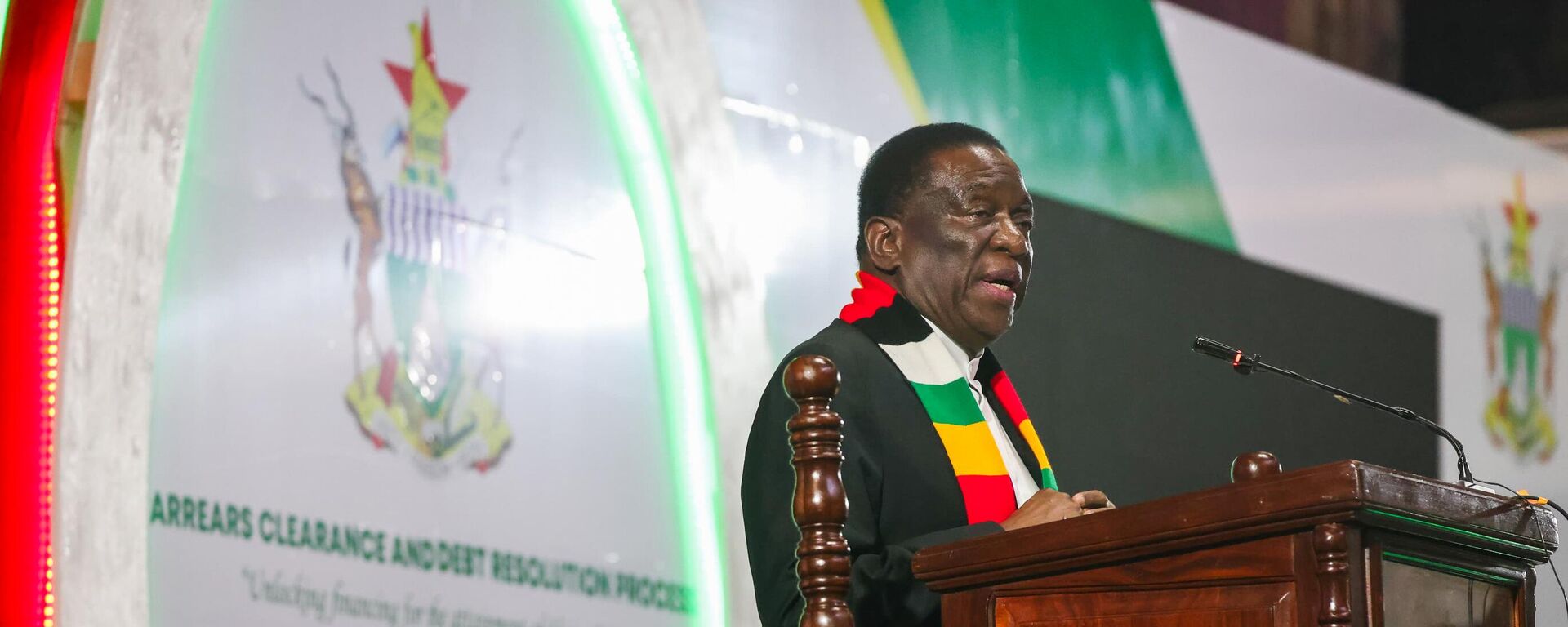https://en.sputniknews.africa/20241202/african-debt-crisis-500-surge-in-borrowing-costs-raises-alarms-1069515781.html
African Debt Crisis: 500% Surge in Borrowing Costs Raises Alarms
African Debt Crisis: 500% Surge in Borrowing Costs Raises Alarms
Sputnik Africa
Public debt in Africa has grown by 183% since 2010, according to the UN, fueled by global economic shocks and structural issues. Countries now spend more on... 02.12.2024, Sputnik Africa
2024-12-02T17:36+0100
2024-12-02T17:36+0100
2024-12-02T17:36+0100
african development bank (afdb)
nigeria
africa
world bank
debt
economy
west africa
crisis
united nations (un)
finance
https://cdn1.img.sputniknews.africa/img/07e7/0c/01/1063881151_0:46:3072:1774_1920x0_80_0_0_f6c82c957bf2cbbcfd8c6bc42f79ab70.jpg
African nations are facing a 500% increase in debt servicing costs when borrowing from global markets, according to African Development Bank (AfDB) Vice President and Chief Economist, Prof. Kevin Urama, as reported by the Punch newspaper on Monday.Speaking at the 5th African Union Extraordinary Session in Abuja, Nigeria, Urama revealed the rising financial strain caused by soaring borrowing costs and the continent's shifting debt structure. By the end of 2023, 49% of Africa’s debt is privately owned, a figure expected to rise to 54% in 2024.According to the report, Urama explained that this shift toward private creditors has significantly worsened Africa's debt burden, with nations now paying far more in interest compared to borrowing from multilateral institutions like the AfDB or the World Bank. He highlighted that the average debt servicing costs for 49 African countries rose from 8.4% of GDP in 2015 to 12.7% in 2022, while public debt has increased by 170% since 2010. In 2024 alone, African nations are projected to spend $74 billion on debt servicing, with $40 billion owed to private creditors.The AfDB VP also reportedly emphasized that the continent’s reliance on short-term, high-cost debt to finance long-term development projects poses significant risks to debt sustainability. He noted that 20 African nations are now in debt distress or at high risk of it, compared to 13 in 2010. This growing crisis has been driven by structural global debt system issues, recent economic shocks, and weaknesses in African macroeconomic frameworks.To address these challenges, Urama reportedly called for the creation of an African Financial Stability Mechanism, a long-term AfDB initiative aimed at offering sustainable debt refinancing solutions at more favorable terms. He also urged urgent reforms in the global financial system, pointing out that Africa is the only continent without a regional financial stability mechanism, leaving it vulnerable to external economic shocks.
https://en.sputniknews.africa/20241125/zimbabwes-mnangagwa-discusses-countrys-21bln-debt-reduction-with-creditors-1069399472.html
nigeria
africa
west africa
Sputnik Africa
feedback@sputniknews.com
+74956456601
MIA „Rossiya Segodnya“
2024
Christina Glazkova
https://cdn1.img.sputniknews.africa/img/07e7/0b/07/1063380906_0:0:673:674_100x100_80_0_0_79628b4d0cd9f29291a57aa13bbf9e7a.jpg
Christina Glazkova
https://cdn1.img.sputniknews.africa/img/07e7/0b/07/1063380906_0:0:673:674_100x100_80_0_0_79628b4d0cd9f29291a57aa13bbf9e7a.jpg
News
en_EN
Sputnik Africa
feedback@sputniknews.com
+74956456601
MIA „Rossiya Segodnya“
Sputnik Africa
feedback@sputniknews.com
+74956456601
MIA „Rossiya Segodnya“
Christina Glazkova
https://cdn1.img.sputniknews.africa/img/07e7/0b/07/1063380906_0:0:673:674_100x100_80_0_0_79628b4d0cd9f29291a57aa13bbf9e7a.jpg
african development bank (afdb), nigeria, africa, world bank, debt, economy, west africa, crisis, united nations (un), finance
african development bank (afdb), nigeria, africa, world bank, debt, economy, west africa, crisis, united nations (un), finance
African Debt Crisis: 500% Surge in Borrowing Costs Raises Alarms
Christina Glazkova
Writer / Editor
Public debt in Africa has grown by 183% since 2010, according to the UN, fueled by global economic shocks and structural issues. Countries now spend more on debt interest than on critical services like health and education, exacerbating poverty and reducing economic growth prospects.
African nations are facing a
500% increase in debt servicing costs when borrowing from global markets, according to African Development Bank (AfDB) Vice President and Chief Economist, Prof. Kevin Urama, as reported by the Punch newspaper on Monday.
Speaking at the 5th African Union Extraordinary Session in Abuja, Nigeria, Urama revealed the rising financial strain caused by soaring borrowing costs and the continent's shifting debt structure. By the end of 2023, 49% of Africa’s debt is privately owned, a figure expected to rise to 54% in 2024.
According to the report, Urama explained that this shift toward private creditors has significantly worsened Africa's debt burden, with nations now paying far more in interest compared to borrowing from multilateral institutions like the
AfDB or the World Bank. He highlighted that the average debt servicing costs for 49 African countries rose from
8.4% of GDP in 2015 to 12.7% in 2022, while public debt has increased by
170% since 2010. In 2024 alone, African nations are projected to spend
$74 billion on debt servicing, with
$40 billion owed to private creditors.The AfDB VP also reportedly emphasized that the continent’s reliance on
short-term, high-cost debt to finance long-term development projects poses significant risks to debt sustainability. He noted that
20 African nations are now in debt distress or at high risk of it, compared to 13 in 2010. This growing crisis has been driven by structural
global debt system issues, recent economic shocks, and weaknesses in African macroeconomic frameworks.
To address these challenges, Urama reportedly called for the creation of an African Financial Stability Mechanism, a long-term AfDB initiative aimed at offering sustainable debt refinancing solutions at more favorable terms. He also urged urgent reforms in the global financial system, pointing out that Africa is the only continent without a regional financial stability mechanism, leaving it vulnerable to external economic shocks.



